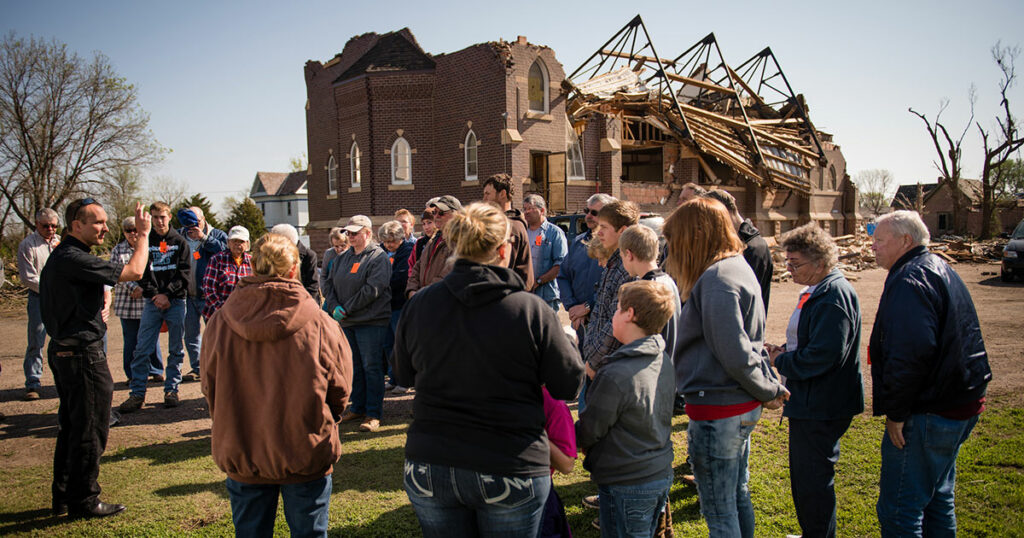Throughout the New Testament prayer is encouraged for the benefit of others. Jesus Himself is an example of that. He not only prayed for Himself, but also for His disciples (John 17:20–22). Paul reminds us to pray for others, “First of all, then, I urge that supplications, prayers, intercessions, and thanksgivings be made for all people, for kings and all who are in high positions, that we may lead a peaceful and quiet life, godly and dignified in every way. This is good, and it is pleasing in the sight of God our Savior” (1 Tim. 2:1–3). Moreover, we are not only called by God to pray for others, but we are called to pray for fellow believers (Eph. 6:18). John encourages prayer for faltering believers (1 John 5:16). James advises, “Is anyone among you suffering? Let him pray” (5:13).
During tragedy or disaster, suffering and loss are there, but James encourages the saints when he says, “The prayer of a righteous person has great power as it is working” (5:16). It is comforting to remember that Jesus is in prayer for the victim and the spiritual caregiver, interceding for both. Paul connects the interceding prayers for believers as a way to keep Christians connected to Christ even during “tribulation, or distress, or persecution, or famine, or nakedness, or danger, or sword” (Rom. 8:34–35).
Prayer is not only scriptural but is taught in the Lutheran Confessions. In fact, Martin Luther directly addresses the issue of praying for this life’s tragedies at length in the Large Catechism, where he wrote that we pray to God
“to protect us from all kinds of harm, to our body and our livelihood, from tempest, hail, fire, and flood; from poison, pestilence, and cattle-plague; from war and bloodshed, famine, savage beasts, wicked men, etc. It is good to impress upon the common people that all these things come from God and that we must pray for them.”[1]
Luther also gives other guidance in the Large Catechism, teaching that “it is not left to my choice here whether to pray or not, but it is my duty and obligation [on pain of God’s wrath and displeasure to pray].”[2] Luther also said that prayer must include a request: “A person who wants to pray must present a petition, naming and asking for something which he desires; otherwise it cannot be called a prayer.”[3] Luther explained that God loves to hear a believer’s prayer: “He likes to hear our crying and sighing. It is the mark of pious children who mend their ways and do not run from Him but want to remain good children.”[4] Lastly, the Large Catechism teaches that God “will be angry and punish all who do not pray, just as surely as He punishes all other disobedience.”[5]
When tragedy happens, it is a reminder that we live in a broken world that is plagued by sin and that even the most beautiful aspects of creation can attack human frailty. In the aftermath of a natural disaster it is common for the affected to be reminded of their need for God to sustain their body and soul. Because prayer is a conversation with God, prayer is an opportunity for victims to confess their sin to God, to offer their request to Him, and to intercede for their loved ones.
During a crisis people tend to turn to God and their faith for strength. During these times it is common to make supplications or petitions to God. It is a godly and pious act to pray and to bring one’s petitions to the Lord. The Large Catechism calls this “calling upon God in every need”[6] and it says, “He [God] requires this of us and has not left it to our choice.”[7] The Lord’s Prayer is a great example of supplications for physical and spiritual blessings. As the believer is in prayer for first article gifts of body and soul, he prays for a mixture of things as he prays for daily bread, God’s will to be done, forgiveness, and deliverance from the power of the evil one.
When a natural disaster affects a believer, his family, or his congregation’s community, it is common for many to view God as their enemy. Viewing God as one’s enemy happened throughout the Old Testament, in Job (2:9), Exodus (14:10-12, 16:2, 17: 1-7), Lamentations (2), and in at least five of the Psalms (6, 44, 74, 88, and 90). The Psalms that view God as enemy or where He is blamed for causing despair are called, “Psalms of Lament” or “Psalms of Complaint.” Psalms 6 and 88 mention near death experiences. A victim of disaster who survives a tornado or hurricane could relate to the Psalms which question God and ask, “why.” Ingvar Fløysvik explains that there is a threefold pattern within the complaint Psalms, they: 1) bring a problem before God, 2) pray to God for something specific, 3) make an appeal to God for Him to change His course.[8] Praying or reading the complaint songs after a natural disaster could be encouraging and healing to victims and their family members. The Spiritual Care Companion for Times of Disaster has included Psalm 6 because of its universal nature by which it begins with a petition for God’s grace and mercy and ends in the sure confidence that God has listened to the prayers of the person in despair.
Prayer is critical in a time of tragedy. Simply stated, it is commanded by God. “Prayer, therefore, is as strictly and solemnly commanded as all other commandments such as having no other God, not killing, not stealing, etc. … To pray, as the Second Commandment teaches, is to call upon God in every need. This God requires of us; he has not left it to our choice.”[9] But more than a command of God, prayer is a blessing. Luther explained the benefit of prayer in tragedy: “This we must know, that all our safety and protection consist in prayer alone. We are far too weak to cope with the devil and all his might and his forces arrayed against us, trying to trample us underfoot.”[10] Hence, when a Christian prays with another, one ought to remember that he or she is bringing him or her into good shelter of rest and protection against the brokenness of this world and the devil’s schemes against him.
In addition to written prayers for specific disasters, author Joel Petermann in Prayer: An Audience with the King, recommends using the Lord’s Prayer as a handbook or a guide to prayer.[11] For example, Christ teaches us to pray “Hallowed be thy name.” According to Petermann, if we follow this pattern, all of our prayers should “uphold the family name;”[12] in other words, it should honor our Father’s name. It is a reminder to keep God’s name holy. Another example of this pattern is the fifth petition, “And forgive us our trespasses as we forgive those who trespass against us.” Petermann reminds the reader that part of the pattern of prayer is to “Quiet my conscience, contain my conceit.”[13] He believes that the Lord’s Prayer is creating a pattern so that we need to remember to ask for God’s forgiveness because without that forgiveness of sins, “all is lost.” This wise advice is echoed by Martin Luther. In Luther’s tract, A Simple Way to Pray, he gives advice to spiritual caregivers about prayer, to anchor themselves and others spiritually. Luther states,
“I begin by saying the Ten Commandments out loud to myself, then the Creed, and if I have time, I like to repeat certain sayings of Christ, or of Paul, or the Psalms … We have to be absolutely certain that we do not allow ourselves to be distracted from genuine prayer. The devil is not lazy! He will never stop attacking us … That’s why saying out loud the Ten Commandments, the Creed, the words of Jesus, etc., will move your heart and you will realize it is time for you to get down on your knees, or stand, and with folded hands look toward heaven and say out loud, or think: ‘O, Heavenly Father, Dear God, I am an unworthy, wretched sinner. I do not deserve to lift my eyes and hands to heaven and pray. But because You have commanded us to pray and promised to hear such prayer …’”[14]
Harrison prefaced the Reformer’s tract in this way: “In this little work the reformer lays out his simple method of praying texts of the Ten Commandments, the Lord’s Prayer, and the Creed. It’s brilliant. I call it ‘I.T.C.P’: Instruction, Thanksgiving, Confession, Prayer.”[15] John Pless explained Luther’s use of catechetical prayer as, “[prayer] anchored in the Word of God and not allowed to become the playpen of human emotion and imagination.”[16] Hence, praying through the Lord’s Prayer with disaster victims can be a helpful practice especially with Lutherans who have been catechized about the meaning of each of its petitions.
[1] Tappert, The Book of Concord: The Confessions of the Evangelical Lutheran Church, Large Catechism III, 78–79, 431.
[2] Tappert, Large Catechism III, 9, 421.
[3] Tappert, Large Catechism III, 24, 423.
[4] Martin Luther, Luther’s Works: Sermons on the Gospel of St. John, Vol. 24, ed. Jaroslav Pelikan, (St. Louis: Concordia,1961), 392.
[5] Tappert, Large Catechism III, 18.
[6] Tappert, Large Catechism III, 8, 421.
[7] Tappert, Large Catechism III, 8, 421.
[8] Ingvar Fløysvik, When God Becomes My Enemy: The Theology of the Complaint Psalms (St. Louis: Concordia, 1997), 24.
[9] Large Catechism III, 6 and 9, Tappert, 421.
[10] Large Catechism III, 30, Tappert, 424.
[11] Joel V. Petermann, Prayer: An Audience with the King (Milwaukee: Northwestern, 2001), 150.
[12] Petermann, Prayer: An Audience with the King, 156.
[13] Petermann, Prayer: An Audience with the King, 159.
[14] Martin Luther, A Simple Way to Pray, trans. Matthew C. Harrison (St. Louis: Concordia, 2012), 6–7.
[15] Luther, A Simple Way to Pray, 3.
[16] Scott C. Klemsz, ed., We Believe: Essays on the Catechism (Fort Wayne: Concordia Theological Seminary Press, 2000), 75.

